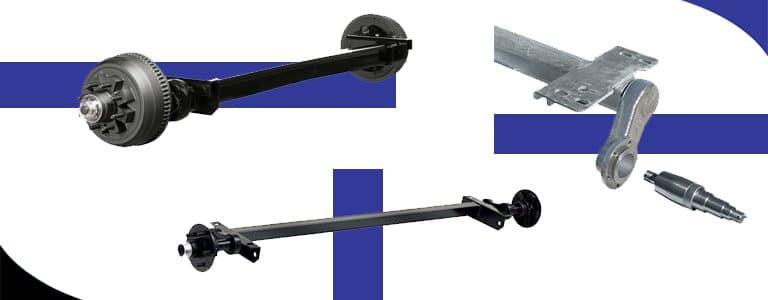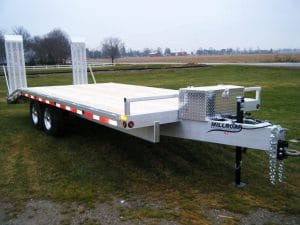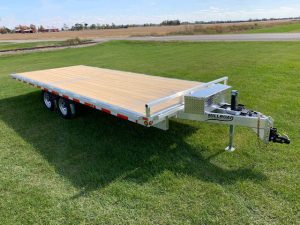
March 12, 2020 Last updated on June 16, 2023 by Bob Fisher Bob Fisher Deckover Trailers
When customizing your new Millroad deckover trailer, the decision of which axles to get can be intimidating, especially when you consider that having the correct axles is essential for safety. The good news is that you don’t need to have a background in mechanics to understand what axles are and how they work. With this short overview, we’ll guide you through what you should know to get the right setup for your needs.

In the most basic terms, the axle is a shaft that transfers the trailer weight and drive to the wheels. This simple-sounding shaft, though, may be the most complex part of the trailer. Loads that are too heavy or are not balanced correctly in relation to the shaft and wheels can cause the trailer to drift from side to side or become unstable.
Axles are rated by a load capacity that specifies the amount of weight that they can support. Trailers with multiple axles can carry the sum of all these load capacities, as long as the tires and towing vehicle are also rated for the total weight. The actual amount of weight that a trailer can safely carry is the smallest load capacity rating for any part. This means if your trailer has two axles rated for 5,200 pounds, it is capable of carrying 10,000 pounds, if but the tires are only rated for 4,000 pounds, the trailer can only safely carry 4,000 pounds until you replace the tires.
Leaf springs and torsion axles are the most common options for a trailer. Both types do the same job. The biggest difference between them is how they suspend the load.
Spring axles work using a spring to support the trailer and load. Usually, the springs are positioned under the shaft, but some arrangements have the spring across the top of the shaft. This type of axle costs less when you first purchase it, but it uses a lot of moving parts. All of these moving parts wear out over time, especially when they are constantly exposed to the rain, mud, snow, and rough roads that are inevitable in Canada.

TorFlex torsion axles are made up of a square spindle surrounded on all four sides by rubber. The spindle is connected to torsion arms that then attach to the wheels. The core moves back and forth against the rubber, and its motion makes the torsion arms turn the wheels.
The motion of the spindle and torsion arms is smooth, and the system absorbs shocks well, which makes it especially ideal for the gravel and back roads of Canada. Though this arrangement typically costs more up front than springs, the lack of maintenance and downtime save money in the long run. Because of all of these benefits, we recommend TorFlex torsion axles to our customers whether they are driving on nicely paved roads or the roughest trails that the country has to offer.
When you are planning to get the axles for your new trailer from us, the decision is easier than it may seem at first. We take care of the work of making sure that the dimensions, mounting, and brakes are right for the trailer size and load capacity that you choose.
The most important question for you to consider is how much weight you need the trailer to carry. It is usually best to prepare the trailer to be able to hold more weight than you think you will really need, because it doesn’t hurt anything to carry less weight than the trailer is rated for. On the other hand, the trailer would have to be refitted if you later decide you want it to carry more weight than the axle is designed for. If you still have questions about your trailer and axles, call or email us for help.
Notifications